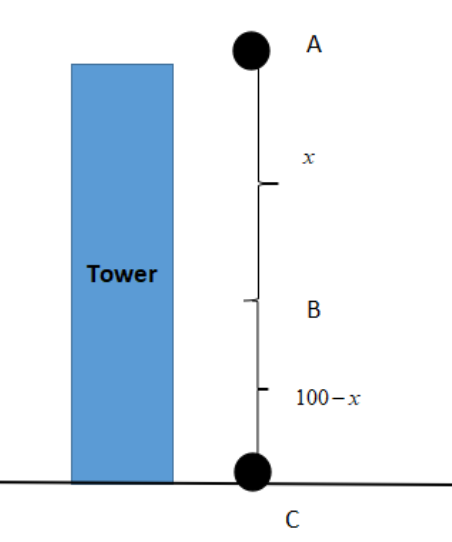Question
Question: A ball is dropped from the top of a tower of height \[100{\text{ }}m\] and at the same time another ...
A ball is dropped from the top of a tower of height 100 m and at the same time another ball is projected vertically upwards from ground with a velocity 25 ms−1. Then the distance from the top of the tower, at which the two balls meet is.
A. 68.4 m
B. 48.4 m
C. 18.4 m
D. 28.4 m
E. 78.4 m
Solution
- We can clearly get the idea from the question that the total distance travelled by those two balls is equal to the height of the tower.
- To find out the distance travelled by those balls we can use s=ut+21at2.
- For the first ball, the initial velocity is 0. It will move with an acceleration of 9.8ms−2.
- For the second ball, the initial velocity is 25ms−1. It will move with a retardation of 9.8ms−2.
- Those two balls will travel for equal time.
- We have to find out the distance travelled by those two balls in time t. Sum of those distances travelled by those two balls is equal to the total height of the tower.
-From that we will get the value of t.
-Now, putting the value of t in s=ut+21at2 for the second ball, we can easily get the answer.
Complete step by step answer:
Let (A) denotes the top of the tower and (C) denotes the foot of the tower. And (B) is the point where those balls met each other after time t.
Let, the distance travelled by the first ball in time t, AB = x
As, the total height of the tower is 100m.
So, the second ball has to cover a distance of 100−x in the same time if it has to meet the first ball.
BC = 100−x
For first ball,
Initial velocity, u = 0$$$\left( {{\text{ }}As,{\text{ }}it{\text{ }}was{\text{ }}released{\text{ }}from{\text{ }}the{\text{ }}top{\text{ }}of{\text{ }}the{\text{ }}tower} \right).$$ It will fall down with gravitational acceleration, g = 9.8m{s^{ - 2}}.And,wehaveassumedthatithastravelledxdistanceintimet$.
So, using the formula s=ut+21at2
Where s is the distance travelled in time t, u is the initial speed and a is the acceleration.
Putting those values,
x=0×t+21×9.8×t2
⇒ x=4.9t2 …………………………….(1)
For second ball,
Again to get the distance travelled by the second ball we have to use, s=ut+21at2.
Where,
Initial velocity, u=25ms−1.
And the ball is travelling for time t but with a retardation (as gravitational force on the ball is acting opposite to the motion of the ball) of 9.8ms−2.
So,a=−9.8ms−2
An, already we have assumed the distance travelled by the ball is (100−x).
So, 100−x=25×t+21×(−9.8)×t2
⇒ 100−x=25t−4.9t2
⇒ 100−4.9t2=25t−4.9t2 [Using equation (1)]
⇒ 100=25t
⇒ 25t=100
⇒ t=25100=4

So, after t=4s those two balls will meet each other.
Now, putting the value of t in equation (1),
x=4.9×42=4.9×16=78.4m
So, they will meet each other at (B), which is 78.4mdistance away from the top.
So, the correct answer is “Option E”.
Note:
- If velocity of any object is increasing, it means that object is moving with positive acceleration.
- And, if velocity of any object is decreasing, it means that object is moving with negative acceleration or retardation.
- We should take care while putting the value of acceleration in any equation. Students should check whether velocity of that object is decreasing or not.
- Students should take care of units. Before putting all data in the equation we should convert all units in the SI unit system.
